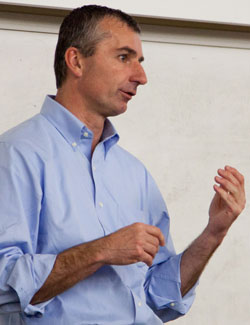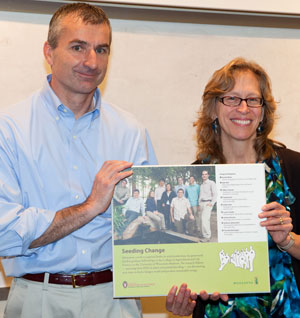
Robert Reiter (’87 MS ALS, ’89 PhD ALS), Monsanto’s vice president of breeding technology, explores “Technologies Shaping Plant Breeding” in a presentation to students and faculty.
- Increasing the productivity and sustainability of bioenergy crops.
- Diminishing the risk of planting corn early.
- Increasing crop disease resistance.
These are the kinds of projects the nine 2010 Monsanto Fellows are completing in the College of Agricultural and Life Sciences. The PhD students, pursuing their degrees in plant and animal breeding, are discovering new ways to feed a hungry world and produce sustainable energy.
Monsanto, a leader in seed production, established a $1 million fund to encourage new professionals in plant breeding. More than a dozen company officials from St. Louis and Wisconsin visited the University of Wisconsin-Madison campus November 17 and 18 to meet individually with the fellows and their advisors to discuss the students’ work. They also visited with plant science graduate and post doctoral students, and scientists working on animal genetics and breeding, statistical genetics and biofuels. Robert Reiter (’87 MS ALS, ’89 PhD ALS), Monsanto’s vice president of breeding technology, explored “Technologies Shaping Plant Breeding” in a presentation to students and faculty.
The graduate students are the first cohort of CALS Monsanto Fellows. They have come to the College from across the United States and China. They include:
- Joshua Parsons spent a year in Zaire after earning his undergraduate degree in agriculture education. “I saw the very poor state of agriculture and especially the poor quality seeds that were available to the local people,” he said. “I came to Madison with the full intention of returning to the Congo and helping to produce seeds adapted to local growing conditions.” Parsons hopes to help reduce the amount of nematicides used on carrot fields by locating the genes resistant to nematodes that cause deformation and crop loss.
- Loren Trimble’s first high school job found him pollinating corn on field work crews. He now studies regions of the corn genome involved with domestication to identify the loci associated with seedling emergence, endosperm composition and early vigor. He would like to diminish the risk of planting early corn and so expand the planting window.
- Tim Beissinger was a math major until he discovered plant genetics through a part-time job. “Plant breeding directly and immediately impacts the world,” he said. “Upon realizing that the many years I had spent working on a math degree could be used as a unique skill in breeding, I knew I had found my future career.”
- A trip to the International Maize and Corn Improvement Center headquarters in Mexico convinced Jillian Foerster to pursue a degree in plant breeding. Her goal is to characterize genes that underlie the juvenile to adult vegetative phase change in maize. She also will evaluate the transition on biomass quality and insect or disease resistance. Her work could improve stover quantity and quality for the biofuel industry, she said.

Robert Reiter with CALS Dean Molly Jahn.
For more information about plant genetics, visit the Plant Breeding and Plant Genetics program.
